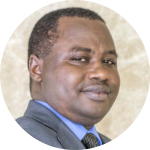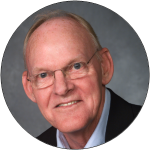

FIG Article of the Month - November 2021 |
In this recording that is offered to you in this "Video of the Month Series" Jaap Zevenbergen introduces the topic and facilitates the presentations on fit-for-purpose land administration by Emmanuel Nkurunziza, Amy Coughenour Betancourt and Stig Enemark.
On Tuesday 22 June 2021, at the FIG Working Week in Amsterdam, Netherlands, three eminent speakers from the land administration field came together to take stock of about a decade of FFP-LA, how it progressed and what challenges lay ahead. The online polls among those in attendance showed that land professionals are open and supportive of more FFP ways of working and involvement of the local communities when collecting land information.
Well organised land administration systems can support countries achieving sustainable development. They can support responsible land policies and land management strategies, assist land dispute reduction, enable fair investment opportunities, support social and spatial justice, and overall good governance. However, a large number of people-to-land relationships (read: tenures) are unaccounted for in formal land administration systems, especially in the developing countries. This undermines equity, equality and the achievement of the Sustainable Development Goals (SDGs). Conventional surveying approaches face diverse challenges in costs and time needed to comes to scaling and completion of land administration systems. Fit for Purpose approaches challenge the earlier paradigm. They seek lower costs, less recording time, and appropriate spatial data qualities. With FFPLA having now being on the FIG agenda for almost a decade, this session reflected on the successes, challenges, and future directions of the FFP-LA approach.
The three speakers with a different background - more governmental, bridging community participation with geospatial industry and more academic - joined, but all highlighted issues that need to be addressed to quickly increase the number of people-to-land relationships that is accounted for and registered. After several years of discussion, it was in 2014 with FIG publication 60 - shared between FIG and the World Bank and with Honorary President Stig Enemark as first author - that the issue really came to the table. In the meantime more and more countries are applying FFP-LA concepts in scaling up towards full land administration coverage. Several examples were mentioned in the presentations, and even more in the three episodes of the linked workshop on 24 June 2021 during the e-Working Week
Objective of the session
In this keynote session the presenters from the land administration field that showed best practices, showed how the spatial industry has taken up the concept, and revisited how the concepts have developed and need further development. All to move FFP-LA along in the future. To listen to a short overview by Jaap Zevenbergen and longer exposés from the three presenter go to: https://youtu.be/SCKuvlXKUy4
Jaap Zevenbergen states:
" It was a real pleasure to facilitate this working week keynote session. Even with the three presenters online on the large screens and me and Mila Koeva in the studio, it felt like a true plenary. I was glad to see the openness to change among the participants in the polls, and it was great to hear Emmanuel Nkurunziza stress that much more work for land professionals has come in Rwanda after their FFP-LA like approach in the 2000s."
Click here, to check out more papers on best practices and future ideas.
 |
Emmanuel Nkurunziza, Director General of the Regional Centre for Mapping of Resources for Development (RCMRD)Dr. Emmanuel Nkurunziza is the Director General of Regional Centre for Mapping of Resources for Development (RCMRD) – an intergovernmental organization with 20 contracting Member States in Eastern and Southern Africa. He took up this position early this year after an 8 year tenure as the Director General of Rwanda Natural Resources Authority, a position he held concurrently with that of Chief Registrar of Land Titles. Dr. Nkurunziza provided the technical and strategic direction to the development and implementation of Rwanda's land reform programme that managed to bring all land in the country under registered title and established a modern land administration system. The titling programme in Rwanda pioneered full-scale implementation of what are now generally referred as fit-for-purpose land administration techniques and approaches. Dr. Nkurunziza's academic background is in Land Surveying but holds a masters degree in Urban planning from the University of Wales (Cardiff) and PhD in Public Policy from the University of Birmingham (UK). He began his career in the academia, having worked in various roles as Research Fellow and Lecturer in the Universities of Makerere (Uganda) and Birmingham (UK). He has undertaken research and published on urban land delivery systems as well as livelihoods. |
 |
Stig Enemark, Honorary FIG President, Senior Consultant and Professor Emeritus of Land Manaement, Aalborg University Denmark.Stig Enemark is Honorary President of the International Federation of Surveyors, FIG (President 2007-2010). He is a Senior Consultant and Professor Emeritus of Land Management, Aalborg University, Denmark, where he was Head of School of Surveying and Planning for 15 years. Before joining the university, he was a licensed surveyor in private practice. He is a well-known international expert in the areas of land administration systems, land management, and spatial planning, and related issues of education and capacity development. He has consulted and published widely within these areas. For a full list of more than 400 publications. |
 |
Amy Coughenour, CEO of Cadasta FoundationAmy Coughenour, CEO of Cadasta Foundation, oversees a global team advancing land and resource rights. Cadasta has grown its impact to over 5 million people with 77 partners in 36 countries. Amy was the COO of International Programs at the National Cooperative Business Association-CLUSA, leading the resilience, food security, and cooperative portfolio in 20 countries. Amy was Deputy Executive Director, Pan American Development Foundation; Deputy Director of the Americas Program, Center for Strategic and International Studies; and has held senior roles and board positions in various social sector organizations for three decades. She holds an M.A. in International Policy Studies from the Middlebury Institute of International Studies and a B.A. in German from Central College |
 |
Jaap Zevenbergen, Head of Department of the Urban and Regional Planning and Geoinformation Management University of Twente ITC FacultyJaap Zevenbergen is Head of Department of the Urban and Regional Planning and Geoinformation Management department of the Faculty ITC of the University of Twente. He studies and consults on cadastral and land (information) management issues, and capacity development on those topics, in a wide range of countries. He has (co) supervised 25 completed and 12 ongoing PhD studies, and acted as external examiner to almost 50 others. He currently is the Editor-in-Chief of the journal Land Use Policy and is (co)author of 100 peer reviewed papers in the field. He served and serves on several boards within the land sector, currently of the Land Portal Foundation, and before of Cadasta Foundation and Global Land Tool Network. He studied both land surveying and real-estate law in the Netherlands and combined the two in his PhD study on systems of land registration, during which he got involved in early cadastral projects in Eastern Europe, while also consulting on Dutch projects linked land information management. More recently the focus has been mainly in Africa, as well as in South-East Asia and Latin America. |